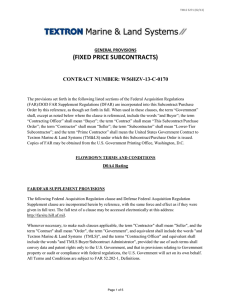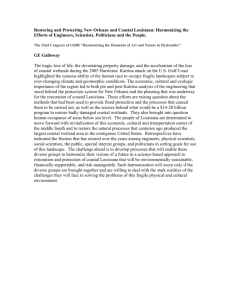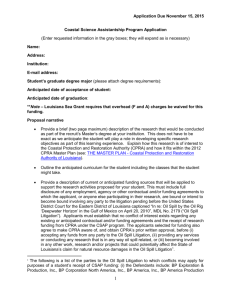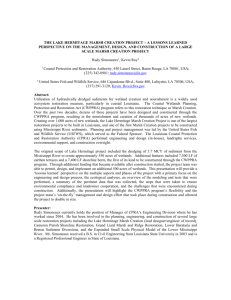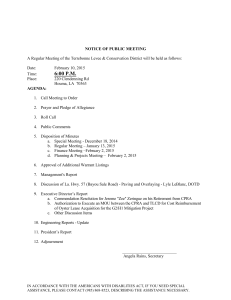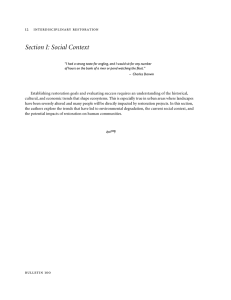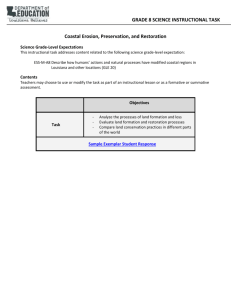Applying a Planning Tool for the Louisiana Coastal Master Plan
advertisement
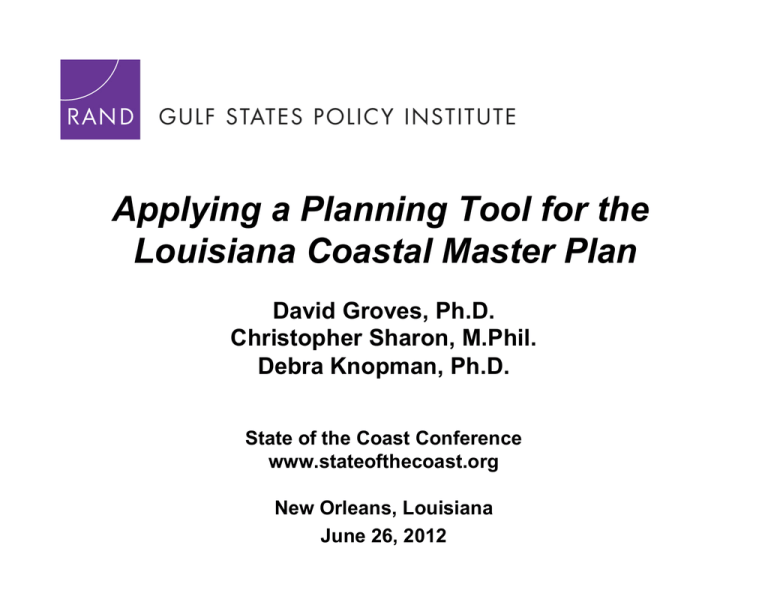
Applying a Planning Tool for the Louisiana Coastal Master Plan David Groves, Ph.D. Christopher Sharon, M.Phil. Debra Knopman, Ph.D. State of the Coast Conference www.stateofthecoast.org New Orleans, Louisiana June 26, 2012 For More Information…. B Louisiana’s 2012 Coastal Master Plan – www.coastalmasterplan.louisiana.gov/ B Technical Documentation of the Planning Tool – http://www.lacpra.org/assets/docs/2012%20Master%20Plan/Final %20Plan/appendices/FINAL-Appendix-EPlanningToolFINAL_2012_03_28-topost.pdf Groves-2 Jun-2012 Presentation Outline B Planning Challenge B CPRA Planning Tool B Use of Planning Tool to Support Master Plan Groves-3 Jun-2012 CPRA’s Louisiana Coastal Master Plan Seeks Coastal Sustainability … Flood Risk Reduction Restoration Groves-4 Jun-2012 … While Balancing Diverse Objectives Decision Criteria and Ecosystem Services Distribution of flood risk across socioeconomic groups Flood protection of historic properties Flood protection of strategic assets Operation and maintenance costs Sustainability Support for navigation Use of natural processes Support for cultural heritage Support for oil & gas Oyster Shrimp Freshwater Availability Alligator Waterfowl Saltwater Fisheries Freshwater Fisheries Carbon Sequestration Nitrogen Removal Agriculture/Aquaculture Other Coastal Wildlife Nature-Based Tourism Groves-5 Jun-2012 Master Plan Considered Hundreds of Different Projects to Address Flood Risk and Land Loss Nonstructural Measures Groves-6 Jun-2012 Models Used To Evaluate Projects Generated Significant Amounts of Data Groves-7 Jun-2012 Uncertainty About Future Conditions Yielded Different Predictions of Project Effects Scenarios Describe Different Plausible Future Conditions Groves-8 Jun-2012 There is No Optimal Solution—Important Tradeoffs Must Be Made B Risk reduction B Restoration B Use of river B Maintenance of B Near term B Long term diversions . benefits current salinity gradients sustainability Groves-9 Jun-2012 The CPRA Planning Tool Was Developed to Support the Formulation of the Master Plan • RAND Gulf States Policy Institute • Master Plan Delivery Team members – CPRA – University of New Orleans – Brown and Caldwell Groves-10 Jun-2012 The Planning Tool Is a Computer-Based Decision Support Tool 1. Compares and ranks individual projects New Orleans 2. Develops different CPRA Planning Tool combinations of projects for comprehensive strategy 3. Uses interactive visualizations to display tradeoffs and support decisionmaking Groves-11 Jun-2012 Planning Tool Evaluates Hundreds of Restoration and Risk Reduction Projects 43 Sediment diversion 101 Marsh creation 96 Other restoration 34 Structural risk reduction 112 Non-structural risk reduction Implementing all projects would cost more than $200 billion Groves-12 Jun-2012 Planning Tool Compares Individual Projects -- Risk Reduction Cost Effectiveness -- Structural Project Non-Structural Project Groves-13 Jun-2012 Planning Tool Compares Individual Projects -- Near and Long Term Land -- Near Term Land (Year 20) Groves-14 Jun-2012 Long Term Land (Year 50) Planning Tool Compares Individual Projects -- Effects on Ecosystem Services -Example: Upper Breton Diversion 250,000 cfs Alligator Carbon Sequestration Coastal Wildlife Freshwater Availability Freshwater Nature Based Fisheries Tourism Oysters Saltwater Fisheries Shrimp Storm Surge/ Waves Waterfowl Crawfish Upper Pontchartrain Mid Pontchartrain Lower Pontchartrain Upper Barataria Lower Barataria Groves-15 Jun-2012 Birdsfoot Delta Planning Tool Assembles Different Project Combinations to Meet Louisiana’s Objectives B Uses constrained mixed integer program to select combinations of projects that maximize land building and risk reduction Risk Reduction Objective Function Land Area Groves-16 Jun-2012 Planning Tool Assembles Different Project Combinations to Meet Louisiana’s Objectives B Choices are constrained by funding, available sediment, and river flow Groves-17 Jun-2012 Planning Tool Assembles Different Project Combinations to Meet Louisiana’s Objectives B Combinations balance ecosystem health, navigation, and other coastal interests Coastal habitats Decision Criteria Groves-18 Jun-2012 Planning Tool Analysis Based on Few Key Assumptions B Individual project effects are additive B Risk reduction projects affect flood risk only B Restoration projects affect land and ecosystem metrics only Analysis in progress relaxes these assumptions by modeling the Master Plan as a single comprehensive project Groves-19 Jun-2012 Example: Which Projects Should Louisiana Choose to Maximize Land Building and Risk Reduction? 12 Sediment diversion 25 Marsh creation 52 Other restoration 15 Structural risk reduction 33 Non-structural risk reduction $ $50 billion budget Groves-20 Jun-2012 Restoration Projects Would Lead to Significant Increases in Land 5,000 Maximize land building Total land in coastal study 4,500 area (square miles) 4,000 2012 2021 2031 2041 Year 2051 Do nothing (future without 2061 action) Groves-21 Jun-2012 Planning Tool Used To Formulate Master Plan in Iterative Sequence of Steps 1. Compare Individual Projects Develop Alternatives 2. Formulate Alternatives 3. Define Draft Revised instructions Master Plan 4. Define Final Master Plan Planning Team and stakeholders Planning Tool Team Interactive visualizations Deliberate over tradeoffs Groves-22 Jun-2012 Explored Funding Scenarios and Allocation Between Risk Reduction and Restoration Projects Long Term Land Building (relative to current levels) Long Term Risk Reduction Groves-23 Jun-2012 Evaluated Balance Between Near Term and Long Term Benefits Groves-24 Jun-2012 Compared Alternatives Effects on Land Area Groves-25 Jun-2012 Land Area Effect of Alternative by Year 50 (sq km) Compared Alternatives Effects on Decision Criteria Increasing navigation decision criteria has minimal effects on land initially 1800 1600 Max Land 1400 1200 Significant decline in land building as navigation decision criterion score is increased further 1000 800 600 -2.5 -2 -1.5 -1 -0.5 0 0.5 1 1.5 Supports Navigation Groves-26 Jun-2012 Land Area Effect of Alternative by Year 50 (sq km) Compared Alternatives Effects on Ecosystem Metrics 1,750 1,700 Max Land 1,650 1,600 1,550 1,500 1,450 41,000 Decline in land building as the amount of potential shrimp habitat is increased 42,000 43,000 44,000 45,000 46,000 47,000 48,000 Suitability for Shrimp Habitat (Index) 49,000 50,000 51,000 Groves-27 Jun-2012 Planning Tool Developed Draft Alternative for the Draft Master Plan (January 2012) B Identified risk reduction and restoration projects B Broad Project implementation schedule B Estimated combined effect of all projects Groves-28 Jun-2012 Planning Tool Evaluated Public Comments to Develop Final Master Plan (April 2012) B Example: Lake Charles Levee was included in draft master plan and was of concern – Planning Tool showed that eliminating it would increase risk too much – Instead, final plan defers construction until later years to permit additional study Increased risk w/o levee Groves-29 Jun-2012 CPRA Planning Tool Summary Workbook Presents Results from Analyses B Interactive results presented B Public version of the in Tableau visualization environment summary workbook to be available soon Groves-30 Jun-2012

